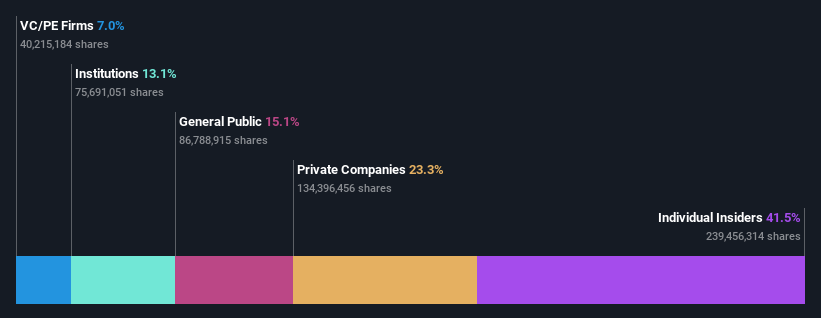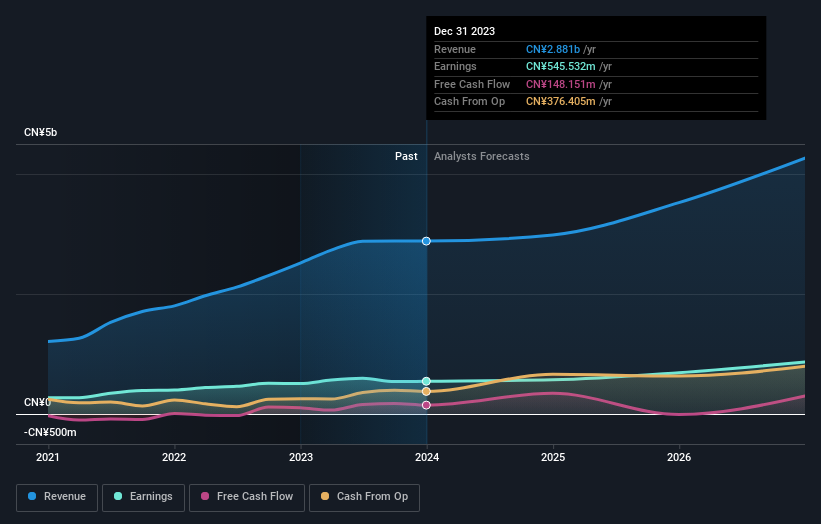Following recent decline, Dongguan Yiheda Automation Co., Ltd's (SZSE:301029) top shareholder CEO Liguo Jin sees holdings value drop by 3.9%

Key Insights
- Insiders appear to have a vested interest in Dongguan Yiheda Automation's growth, as seen by their sizeable ownership
- A total of 5 investors have a majority stake in the company with 53% ownership
- Institutional ownership in Dongguan Yiheda Automation is 13%
If you want to know who really controls Dongguan Yiheda Automation Co., Ltd (SZSE:301029), then you'll have to look at the makeup of its share registry. With 42% stake, individual insiders possess the maximum shares in the company. In other words, the group stands to gain the most (or lose the most) from their investment into the company.
As market cap fell to CN¥10b last week, insiders would have faced the highest losses than any other shareholder groups of the company.
In the chart below, we zoom in on the different ownership groups of Dongguan Yiheda Automation.
View our latest analysis for Dongguan Yiheda Automation

What Does The Institutional Ownership Tell Us About Dongguan Yiheda Automation?
Institutional investors commonly compare their own returns to the returns of a commonly followed index. So they generally do consider buying larger companies that are included in the relevant benchmark index.
Dongguan Yiheda Automation already has institutions on the share registry. Indeed, they own a respectable stake in the company. This implies the analysts working for those institutions have looked at the stock and they like it. But just like anyone else, they could be wrong. It is not uncommon to see a big share price drop if two large institutional investors try to sell out of a stock at the same time. So it is worth checking the past earnings trajectory of Dongguan Yiheda Automation, (below). Of course, keep in mind that there are other factors to consider, too.

Dongguan Yiheda Automation is not owned by hedge funds. Looking at our data, we can see that the largest shareholder is the CEO Liguo Jin with 22% of shares outstanding. In comparison, the second and third largest shareholders hold about 16% and 7.0% of the stock. Interestingly, the second-largest shareholder, Hong Zhang is also Senior Key Executive, again, pointing towards strong insider ownership amongst the company's top shareholders.
Our research also brought to light the fact that roughly 53% of the company is controlled by the top 5 shareholders suggesting that these owners wield significant influence on the business.
Researching institutional ownership is a good way to gauge and filter a stock's expected performance. The same can be achieved by studying analyst sentiments. Quite a few analysts cover the stock, so you could look into forecast growth quite easily.
Insider Ownership Of Dongguan Yiheda Automation
While the precise definition of an insider can be subjective, almost everyone considers board members to be insiders. Company management run the business, but the CEO will answer to the board, even if he or she is a member of it.
Most consider insider ownership a positive because it can indicate the board is well aligned with other shareholders. However, on some occasions too much power is concentrated within this group.
Our most recent data indicates that insiders own a reasonable proportion of Dongguan Yiheda Automation Co., Ltd. It is very interesting to see that insiders have a meaningful CN¥4.3b stake in this CN¥10b business. Most would say this shows a good degree of alignment with shareholders, especially in a company of this size. You can click here to see if those insiders have been buying or selling.
General Public Ownership
The general public, who are usually individual investors, hold a 15% stake in Dongguan Yiheda Automation. While this size of ownership may not be enough to sway a policy decision in their favour, they can still make a collective impact on company policies.
Private Equity Ownership
With an ownership of 7.0%, private equity firms are in a position to play a role in shaping corporate strategy with a focus on value creation. Some investors might be encouraged by this, since private equity are sometimes able to encourage strategies that help the market see the value in the company. Alternatively, those holders might be exiting the investment after taking it public.
Private Company Ownership
Our data indicates that Private Companies hold 23%, of the company's shares. It's hard to draw any conclusions from this fact alone, so its worth looking into who owns those private companies. Sometimes insiders or other related parties have an interest in shares in a public company through a separate private company.
Next Steps:
It's always worth thinking about the different groups who own shares in a company. But to understand Dongguan Yiheda Automation better, we need to consider many other factors. To that end, you should learn about the 2 warning signs we've spotted with Dongguan Yiheda Automation (including 1 which is a bit concerning) .
If you would prefer discover what analysts are predicting in terms of future growth, do not miss this free report on analyst forecasts.
NB: Figures in this article are calculated using data from the last twelve months, which refer to the 12-month period ending on the last date of the month the financial statement is dated. This may not be consistent with full year annual report figures.
New: Manage All Your Stock Portfolios in One Place
We've created the ultimate portfolio companion for stock investors, and it's free.
• Connect an unlimited number of Portfolios and see your total in one currency
• Be alerted to new Warning Signs or Risks via email or mobile
• Track the Fair Value of your stocks
Have feedback on this article? Concerned about the content? Get in touch with us directly. Alternatively, email editorial-team (at) simplywallst.com.
This article by Simply Wall St is general in nature. We provide commentary based on historical data and analyst forecasts only using an unbiased methodology and our articles are not intended to be financial advice. It does not constitute a recommendation to buy or sell any stock, and does not take account of your objectives, or your financial situation. We aim to bring you long-term focused analysis driven by fundamental data. Note that our analysis may not factor in the latest price-sensitive company announcements or qualitative material. Simply Wall St has no position in any stocks mentioned.
Have feedback on this article? Concerned about the content? Get in touch with us directly. Alternatively, email editorial-team@simplywallst.com
About SZSE:301029
Dongguan Yiheda Automation
Engages in the research, development, production, and sale of industrial automation equipment and parts in China.
Flawless balance sheet and slightly overvalued.

